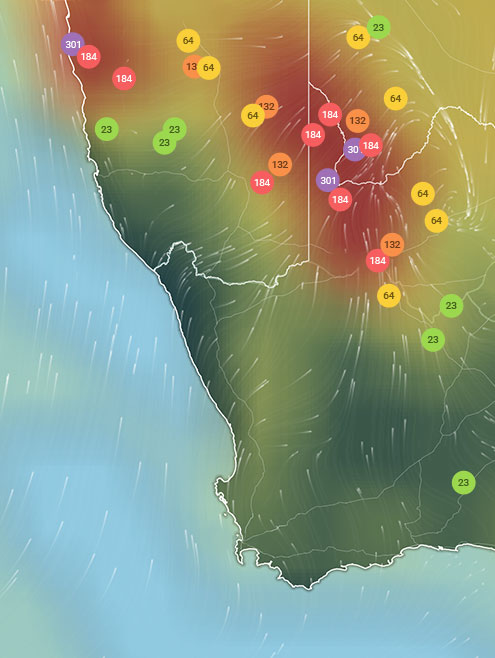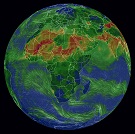Be the first to measure and contribute air quality data to your community
723 people follow this city






AIR QUALITY DATA SOURCE
Find out more about contributors and data sources| Weather | Clear sky |
| Temperature | 75.2°F |
| Humidity | 53% |
| Wind | 2.3 mp/h |
| Pressure | 30.1 Hg |
| # | city | US AQI |
|---|---|---|
| 1 | Campinas, Sao Paulo | 76 |
| 2 | Sao Paulo, Sao Paulo | 70 |
| 3 | Curitiba, Parana | 36 |
| 4 | Porto Velho, Rondonia | 30 |
| 5 | Manaus, Amazonas | 12 |
| 6 | Cruzeiro do Sul, Acre | 11 |
| 7 | Rio Branco, Acre | 10 |
| 8 | Recife, Pernambuco | 8 |
| 9 | Camacari, Bahia | 7 |
(local time)
SEE WORLD AQI RANKING
US AQI
72*
live AQI index
Moderate
| Air pollution level | Air quality index | Main pollutant |
|---|---|---|
| Moderate | 72* US AQI | PM2.5 |
| Pollutants | Concentration | |
|---|---|---|
| PM2.5 | 22*µg/m³ | |
PM2.5
x4.4
PM2.5 concentration in Sao Bernardo do Campo is currently 4.4 times the WHO annual air quality guideline value
| Sensitive groups should reduce outdoor exercise | |
| Close your windows to avoid dirty outdoor air GET A MONITOR | |
| Sensitive groups should wear a mask outdoors GET A MASK | |
| Sensitive groups should run an air purifier GET AN AIR PURIFIER |
| Day | Pollution level | Weather | Temperature | Wind |
|---|---|---|---|---|
| Today | Moderate 72 AQI US | 84.2° 66.2° | ||
| Wednesday, Apr 24 | Moderate 67 AQI US | 73.4° 66.2° | ||
| Thursday, Apr 25 | Good 47 AQI US | 78.8° 64.4° | ||
| Friday, Apr 26 | Moderate 56 AQI US | 86° 66.2° | ||
| Saturday, Apr 27 | Moderate 59 AQI US | 84.2° 69.8° | ||
| Sunday, Apr 28 | Moderate 61 AQI US | 87.8° 69.8° | ||
| Monday, Apr 29 | Moderate 61 AQI US | 89.6° 69.8° |
Interested in hourly forecast? Get the app
São Bernardo do Campo is a Brazilian municipality in the state of São Paulo, and part of its metropolitan region. According to a 2020 census, the estimated population was approximately 850,000 people. This ranks it as the fourth most populous city in the state.
Towards the end of 2021, São Bernardo do Campo was experiencing a period of “Moderate” air quality with a US AQI reading of 55. This United States Air Quality Index number is calculated using the levels of six of the most prolific air pollutants, such as nitrogen dioxide, sulphur dioxide, ozone, carbon monoxide and both sizes of particulate matter, which are PM2.5 and PM10. It can then be used as the metric when comparing air quality in other cities around the world. If data is unavailable for all 6 pollutants, a figure can still be calculated by using what figures there are. In São Bernardo do Campo there were just two pollutants that were measured which were; PM2.5 - 14 µg/m³ and nitrogen dioxide (NO2) - 39 µg/m³.
This level of PM2.5 is just under one and a half times the recommended safe level of 10 µg/m³ as suggested by the World Health Organisation (WHO) as being an acceptable level. Although no amount of air pollution is considered to be safe.
When air quality is “Moderate” the given advice would be to stay indoors as much as possible, closing all doors and windows to prevent the ingress of more polluted air. Those of a more sensitive disposition should avoid venturing outside if at all possible until the air quality improves. If this is unavoidable, then a good quality mask should be worn at all times. For up-to-date information about air quality, there is an app available from AirVisual.com which is downloadable for all mobile devices. This shows the air quality in real-time.
Air quality can be very volatile as it can easily be affected by so many variables. Looking back at the figures for 2020, published by IQAir.com, it can be seen that the best quality air was to be had during the month of December when the figure was 11.1 µg/m³ which placed it in the “Good” category. For the remaining eleven months of the year, the air quality was classified as being “Moderate” with figures between 12.1 and 35.4 µg/m³. Out of these eleven months, the month of February enjoyed the cleanest air with a reading of 13.1 µg/m³. The month with the dirtiest air was September with a reading of 25.8 µg/m³.
Historically, records pertaining to air pollution were first held in 2018 when a figure of 16.4 µg/m³ was recorded. The following year of 2019 saw a slight deterioration with its reading of 16.7 µg/m³. Another slight was recorded in 2020 when the figure was 15.9 µg/m³, however, this may not be a true indication of reality because of the COVID-19 pandemic. Many vehicles were no longer in daily use because offices were closed and staff were no longer encouraged to commute on a daily basis, in an attempt to halt the spread of the virus. Many factories and non-essential production units were also required to close which removed their emissions from the atmosphere, albeit it on a temporary basis.
As with most big cities, the main source of air pollution is the transportation sector. Private cars, motorcycles, trucks and buses. Many of them are older than 15 years and therefore do not have the latest modern, pollutive preventative fittings.
Currently, seven pollutants are regulated in the country for their recognised damage to health, that is, they must be monitored by the government: smoke, total suspended particles (PTS), inhalable particles (PM10), fine inhalable particles (PM2.5), sulphur dioxide (SO2), nitrogen dioxide (NO2), carbon monoxide (CO) and ozone (O3). Reducing pollution is a challenge in urbanized centres due to the large volume of cars. Mainly for some pollutants that their formation is complex, such as particulate matter and ozone.
Vehicle emissions are common in densely populated regions, as the increase in the number of vehicles is related to the increase in population. And what to do to control a fleet of vehicles. To avoid this type of emission, measures focusing mainly on improving technologies and promoting the use of cleaner fuels have been taken through the Vehicle Emission Control Program.
One of the ways to combat air pollution is to invest in quality, efficient public transport that uses cleaner fuels. In the city, for example, exclusive bus lanes were implemented that allowed buses to travel at higher speeds. Thus, travel time was reduced and, consequently, pollutants originating from vehicle emissions also decreased. After all, higher average speeds make vehicles consume less fuel and emit less pollutants. Reducing car use and promoting and using active transport such as walking, cycling or scootering are also ways to avoid air pollution. Cleaner air can be synonymous with quality of life.
According to a survey released by the World Health Organisation (WHO), nine out of 10 people in the world breathe polluted air. In Brazil, it is responsible for the death of 50,000 people each year, for causing diseases such as lung cancer, heart attack and stroke.
When inhaled, pollutants from smoke, such as carbon monoxide, carbon dioxide and nitrogen oxides, are distributed throughout the body in the bloodstream, which can cause several problems.
Although at first, other organs do not seem to be affected, we already know that, directly or not, smoke is related to the increased prevalence of heart attacks, strokes, greater risk of cancer and even chronic diseases.
The amount of air pollution depends on the number of emission sources (many vehicles and industries, use of firewood and gas in the kitchen), the topography and the city's climate. Places with little wind and rain or that are surrounded by hills tend to be more polluted. In winter, pollution gets worse, because the cold makes it difficult for it to move away from the ground.
No locations are available.